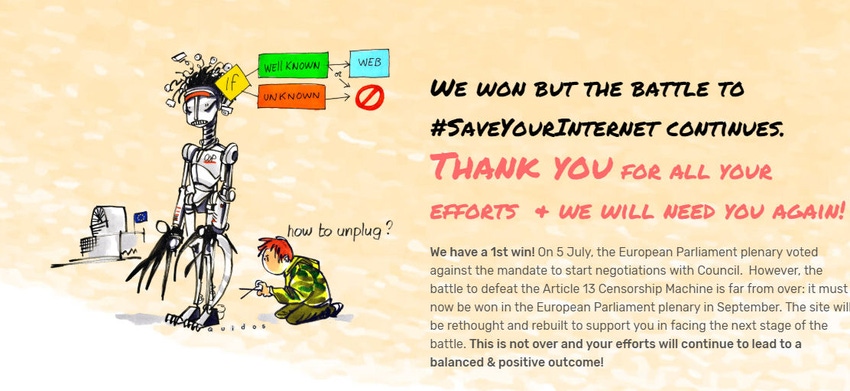The European Parliament has voted to reject a new Copyright Directive that many feared would critically damage the way we use the internet.
July 5, 2018

The European Parliament has voted to reject a new Copyright Directive that many feared would critically damage the way we use the internet.
The Directive on Copyright in the Digital Single Market is positioned as an attempt to harmonise online copyright laws with offline ones and, of course, to standardise these across the continent. The key distinction seems to be around the republishing of copyrighted material, which happens all the time online via memes, mash-ups and all kinds of other user-generated interpretations of public material.
You can read the full details of the proposed directive, together with the reasons for drafting it, here. But for those of you that have better things to do with their time, the stated rationale is to encourage creativity by giving rights holders more protection. Those opposed to it, of which there are many, think it will undermine a core premise of the internet by imposing onerous copyright burdens on platforms and creators.
The part that upset these dissenters is Article 13:
Use of protected content by information society service providers storing and giving access to large amounts of works and other subject-matter uploaded by their users
Information society service providers that store and provide to the public access to large amounts of works or other subject-matter uploaded by their users shall, in cooperation with rightholders, take measures to ensure the functioning of agreements concluded with rightholders for the use of their works or other subject-matter or to prevent the availability on their services of works or other subject-matter identified by rightholders through the cooperation with the service providers. Those measures, such as the use of effective content recognition technologies, shall be appropriate and proportionate. The service providers shall provide rightholders with adequate information on the functioning and the deployment of the measures, as well as, when relevant, adequate reporting on the recognition and use of the works and other subject-matter.
Member States shall ensure that the service providers referred to in paragraph 1 put in place complaints and redress mechanisms that are available to users in case of disputes over the application of the measures referred to in paragraph 1.
Member States shall facilitate, where appropriate, the cooperation between the information society service providers and rightholders through stakeholder dialogues to define best practices, such as appropriate and proportionate content recognition technologies, taking into account, among others, the nature of the services, the availability of the technologies and their effectiveness in light of technological developments.
Thanks to the involvement of prominent figures like Actor Stephen Fry, Internet creator Tim Berners-Lee and Wikipedia founder Jimmy Wales, the opposition movement was large and prominent. A bunch of them sent a letter to the President of the European Parliament and saveyourinternet.eu urged people to hassle their own MEPs about it. A few national Wikipedia sites even shut themselves down in protest prior to the vote.
Well it seems to have worked because the vote took place today and 318 out of 627 MEPs voted against it, with 31 abstaining. This apparently means the whole thing is shelved until September, then it will be debated further and, in theory, amended before being voted on once more. You can be sure those amendments will be closely scrutinised by the above protest groups.
MEP Axel Voss was the person promoting the directive within the European Parliament. He wasn’t happy with the nature of the opposing campaigns and had the following to say after he lost. “I regret that a majority of MEPs did not support the position which I and the Legal Affairs Committee have been advocating. But this is part of the democratic process. We will now return to the matter in September for further consideration and attempt to address peoples’ concerns whilst bringing our copyright rules up to date with the modern digital environment.”
Jimmy Wales was pretty happy and symbolically retweeted a photo from a Hollywood movie to both celebrate the victory and illustrate the kind of meme-driven online activity that he and his fellow dissenters feared would be prohibited by the directive.
The #saveyourinternet campaign came over as somewhat hysterical and hyperbolic, but it made its point well and, for the time being at least, won. Europe has a bad habit of prioritizing harmonization and standardization over all other considerations and this was probably a much needed reality check. Voss and co will surely need to deliver substantial improvements to the directive before any of those 318 MEPs can justify switching sides in September.
About the Author(s)
You May Also Like







.png?width=300&auto=webp&quality=80&disable=upscale)

.png?width=300&auto=webp&quality=80&disable=upscale)
_1.jpg?width=300&auto=webp&quality=80&disable=upscale)



.png?width=800&auto=webp&quality=80&disable=upscale)